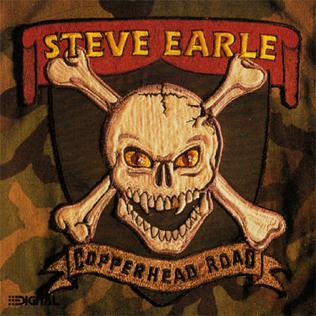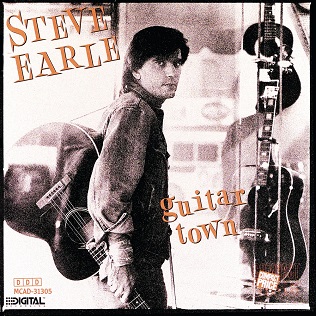This was where I first heard of Steve Earle. It was one of those impulse buys: I had no idea at all who the guy was, where this came in his discography --- was it a debut? Had he been around since the sixties? --- and indeed no idea what kind of music to expect. But the title chimed with me, although moreso it has to be said it was a "bright sparkly thing moment" for me. We've all had them: you see something and you like the look of it. You just have to have it. It can be a book, a stereo system, a dress, a hat, a TV or even a chocolate bar. Doesn't matter. You don't know much about this item but it looks good and you want it! So it was with this album.
To at least make sure I wasn't making a mistake, I flipped the album (yeah, I got it on vinyl) over to look at the back cover. What I saw there convinced me, if the front cover had not already, that this was no hip-hop, dance, electronica or even punk album. On the back is a photo of a big tough beefy guy with muscles you could build a house on, long flowing locks and as was said in Blackadder, a beard you could lose a badger in. Tattoos adorned his bare arms and wrapped around his eyes was a cool set of shades. To top it all off, he was standing beside a sweet motorcycle, wiping his hands with an oily rag as dust or steam rose up from the road behind him.
Aw yeah! This was a
man's album! And I had to expect that the music on its grooves would RAWK! So, suitably reassured I paid the money and took the album home. I propped the sleeve up in front of my turntable and a thoroughly evil and dangerous-looking skull grinned back at me, as if to tell me that I had better be prepared for what I was about to hear.
Copperhead Road (1988) produced by Steve Earle and Tony Brown on the MCA label

I wasn't. The first sound I heard was a long drawn-out pipe sound, like maybe bagpipes. It goes on for a few long seconds before suddenly thunderous drumming pounds in, like the approach of some fearsome giant, its massive footsteps shaking the earth as it comes closer. Then a banjo started up. Bluegrass? Oh dear. But the percussion was so
heavy! Next I heard the gravelly, rasping tones of a man who was going to go on to become one of my favourite artistes, as he sang about the still his grandaddy ran at, you guessed it, Copperhead Road.
So I was still kind of waiting to be convinced. as the song motors along nicely. It tells the story, as I say, of the still where Earle's grandfather made moonshine, its destruction, and his eventual decision to use it as a base for growing weed. About halfway through the song kicks in and I was convinced. This is country rock at its finest and it just gets better. But let's, as they say, get to the breakdown.
1. Copperhead Road (4:30) --- A song that, as I say, starts slowly but builds on a powerful guitar and drumline into a real stomper, telling the story of a moonshine still at Copperhead Road, which apparently is a real road in Tennessee, renamed because with the success of the album too many road signs were being stolen. After it's shut down by the law a Vietnam vet returns home, the grandson of the owner, and begins to grown marijuana there. He's prepared to defend it, as he warns in the closing lines "I learned a thing or two from Charlie, don't ya know? Better stay away from Copperhead Road!" Great starter and a wonderful introduction to the music of this man.
2. Snake oil (3:31) --- We all know what snake oil was, yes? The so-called cure-all that would do everything but cure the common cold, a useless concoction hawked around America by travelling salesmen who were part entertainer, part entrepreneur and part con-man. Here Earle uses snake oil as a metaphor for rash promises --- "I can heal the sick and I can mend the lame, and the blind shall see again: it's all the same" --- while tying it into useless pledges from politicians and remarking how stupid we are to fall for them --- "Ain't your president good to you? Knocked 'em dead in Libya, Grenada too!" It's driven on a powerful, almost exuberant piano line from John Jarvis and an almost rockabilly beat that recalls the best of the debut album. Above all Earle's voice growls out warnings, as he in the role of the salesman grins "You believe that, we're gonna get along just fine!"
3. Back to the wall (5:29) --- The longest track on the album and echoing a darker idea of poverty and hopelessness, this would become a recurring theme throughout Earle's career. It's much more a rock song, with snarly guitar and thick bass as Earle warns "Keep yourself to yourself, keep your bedroll dry. Boy you never can tell what the shadows hide." A lot of John Cougar Mellencamp in this, and with the first two songs basically upbeat this is the first real downer track, heavy with desperation and seething with frustration, the kind of feeling that Earle is only one step away from going into a bank with a shotgun, just to be able to feed his family.
4. The Devil's right hand (3:04) --- Earle introduces this song live with the words "This is not a song about gun control: it's too late for that!" But it is a song about the dangers of romanticising gun ownership. It's run on a sort of slow to mid-paced country beat, with Earle relating the story of a boy who, at fourteen years of age, wishes to have a gun, shocking his mother. When he's old enough to buy one he ends up shooting a miner in a card game, but when arrested claims it wasn't him --- "Not guilty I said, you got the wrong man: nothin' touched the trigger but the Devil's right hand!" Great mandolin work on this from Earle, powerful drumming. NRA probably hate it.
5. Johnny come lately (4:11) --- Very celtic and uptempo, this song features the Pogues and is the story of one of thousands of servicemen returning from 'Nam to "a land fit for heroes", indeed. Earle contrasts the return of his grandfather from World War II with the reception he and his buddies get when returning from America's most unpopular war prior to Iraq. There's plenty of tin whistle, bodhran, banjo and so on, and it's a good kind of drinking song to some extent.
6. Even when I'm blue (4:14) --- Unfortunately, "Copperhead Road" is the epitome of the game of two halves. The first side is pretty flawless; punchy, energetic country rock with more teeth than a Great White. But after that it's almost as if the teeth have been pulled, as the second set of songs that close the album (side two, for anyone as old as me) are a relatively weak collection of maudlin ballads and love songs. It's almost hard to realise that it's the same artiste to be honest. This is not the worst of them, and it has a good thumping beat to it, lots of good guitar, good energy. But something is definitely missing.
7. You belong to me (4:25) --- This is where it really begins to slip. Now in fairness, the first five tracks are all written by Earle solo, whereas he collaborates on two, but it's not these, so he has to take full responsibility --- all right, blame --- for these. This is very short on ideas, as can be witnessed by a listen to the chorus: "You belong to me, you belong to me. Me me me." Uh, yeah. Well, maybe it gets better?
8. Waiting on you (5:10) --- Yeah, it does. "Waiting on you" is the first of the two songs he co-writes, and it's with Richard Bennett, with whom he collaborated on the previous albums. It's driven on a big organ melody and it has a great hook in it. There's a lot of emotion and power in the song, and although it's essentially, like the two above it, a love song, it's got at least a few of its teeth left. Still, considering the "back from the war" theme of the first side, it's odd that the album seems to be tailing off into a bunch of love songs. This has a great organ outro.
9. Once you love (4:39) --- One of the worst --- no,
the worst --- song on the album. I mean, I thought "You belong to me" was half-cocked, but listen to this: "Once you love, once you've trusted, one false move and you know you're busted." Oh dear. There's not a lot to say really. It's the other one he co-writes, this time with Larry Crane. It even starts very similar to one of my least favourite Earle tracks, "Little rock'n'roller"...
10. Nothing but a child (4:26) --- People have slagged this off and tittered that Earle was trying to write a Christmas song, and maybe he was. But I like this. It's got real heart, real emotion and in true country style it pays tribute to Jesus, likening His birth to that of every other baby born every other second across the world. It's the first, and only, slow song on the album, and to be fair is sung almost as a dirge, but is rescued by Earle's outlook on humanity and his assertion that "Every mother kind, and every father proud, looks down in awe to find another chance allowed." Yes it's sentimental and a little derivative, but I like it. It's not the greatest of closers but it's not the worst. Also it has Maria McKee on it, which can never be bad.
Basically, as The Batlord found out when I recommended the album to him, it goes great from track one to five, but then you're almost better stopping, because what follows is generally pretty much a disappointment. Nevertheless, as I say this was my first foray into the world of Steve Earle's music, and I never regretted it. I was prepared to forgive him the "hokey love songs" of side two as long as I had the power country rock of side one to listen to, and those five --- well, add the sixth and eighth track too, they're good if not great --- tracks certainly justified the price of the album.
And better was to come, as two years later Steve Earle would release one of his most complete and almost perfect albums, and start a cycle of excellence that would continue well into the twenty-first century. It would be a good time to be a Steve Earle fan.






 Linear Mode
Linear Mode
